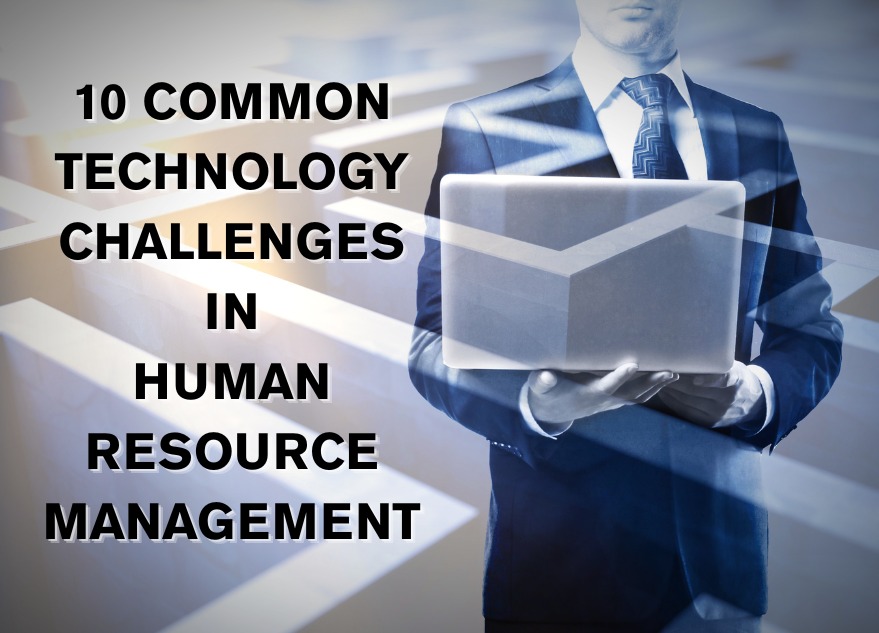Human resource management encompasses the strategic and operational facets of optimizing an organization’s workforce. It involves recruitment, training, performance evaluation, and fostering a conducive workplace culture to maximize employee productivity, satisfaction, and ultimately, organizational success. Human resource management (HRM) faces various technology challenges in today’s digital age. Continue reading to learn about 10 common technology challenges in human resource management:
💡 Are you looking for Coworking space in Gurgaon, Noida or Delhi? We are just a call away.
Call Now: 08999 828282
10 Most Common Technology Challenges in Human Resource Management
- Integration of HR Systems
- Data Security and Privacy
- Employee Engagement Tools
- Remote Work Management Tools
- Training and Development Platforms
- AI and Automation in Recruitment
- Mobile HR Solutions
- Performance Management Systems
- HR Analytics and Insights
- Change Management and Adoption

1. Integration of HR Systems
Many organizations have disparate HR systems for functions like payroll, recruitment, performance management, etc. Integrating these systems to streamline processes and data management can be a significant challenge.
2. Data Security and Privacy
With sensitive employee information stored digitally, ensuring data security and privacy is crucial. For this, the HR needs to implement robust cybersecurity measures and comply with data protection regulations like GDPR or CCPA.
3. Employee Engagement Tools
Selecting the right employee engagement platforms from a plethora of options available can be a real challenge for HR. The aim should be to get employees to actively engage with these tools poses another hurdle.
4. Remote Work Management Tools
The increasing trend of remote work makes it crucial for HR to adopt tools for remote collaboration, communication, and performance tracking. Selecting tools that cater to diverse work arrangements while maintaining productivity and engagement can be a challenge.
5. Training and Development Platforms
Implementing digital platforms for training and development requires significant investment and effort. Ensuring these platforms are user-friendly, accessible, and aligned with organizational goals is crucial for their success.
Also Read: Tips to Create a Human Resource Strategy in 2024
6. AI and Automation in Recruitment
While AI and automation can streamline the recruitment process, they also pose challenges related to bias, transparency, and maintaining a human touch in candidate interactions. Overcoming these issues is a big challenge for HR.
7. Mobile HR Solutions
With the increasing use of smartphones, HR needs to provide mobile-friendly solutions for tasks like leave management, expense reporting, and employee self-service. Ensuring security and usability across different devices and platforms can be challenging.
8. Performance Management Systems
It is important to define clear metrics, and align them with the organizational goals for a fair and transparent evaluation process. All this can be done by implementing a digital performance management system, which again is a big challenge for a company’s HR.
💡 SMBs looking for HR, Marketing, Technology and Funding solutions for their business.
Call Hello Jarvis 994 8000 800
9. HR Analytics and Insights
Leveraging data analytics for HR decisions requires not only the right tools but also the skills to interpret data effectively. HR professionals need to bridge the gap between HR and data analytics to derive actionable insights.
10. Change Management and Adoption
Introducing new HR technologies often requires change management efforts to overcome resistance and ensure successful adoption. Communicating the benefits, providing adequate training, and addressing concerns are crucial for a smooth transition.
To sum up, try addressing the challenges mentioned in this post with a strategic approach and collaboration between HR and IT departments. The emphasis should be on a commitment to continuous improvement and innovation in HR technology.
Set up the office at The Office Pass (TOP) co-working spaces available in Delhi and NCR. TOP offers all the modern-day facilities to run small to medium-sized businesses facilitating positive HR practices. Contact us for more details at 08999 828282.
FREQUENTLY ASKED QUESTIONS (FAQS):
Question: What are the primary concerns regarding data security in HR technology?
Answer: Data security in HR technology encompasses safeguarding sensitive employee information from unauthorized access, breaches, and ensuring compliance with privacy regulations.
Question: What role does HR analytics play in addressing workforce challenges?
Answer: HR analytics enables data-driven decision-making by providing insights into workforce trends, performance metrics, and predictive analytics for identifying and addressing potential challenges such as attrition or skill gaps.
Question: How can HR effectively integrate disparate systems for streamlined operations?
Answer: HR can integrate disparate systems through the use of middleware, APIs, or adopting comprehensive HR management suites that offer modules for various functions like payroll, recruitment, and performance management.
Question: What considerations should HR keep in mind when implementing remote work management tools?
Answer: HR should consider factors like ease of use, compatibility with existing systems, security features, and the ability to support diverse work arrangements when implementing remote work management tools.
Question: How can HR ensure fairness and transparency in AI-driven recruitment processes?
Answer: HR can ensure fairness and transparency in AI-driven recruitment processes by regularly auditing algorithms for biases, providing explanations for automated decisions, and involving human oversight in critical stages of the recruitment process.
Question: How can HR leverage mobile solutions to enhance employee experience?
Answer: HR can leverage mobile solutions to provide employees with easy access to HR services such as leave management, training modules, and communication channels, thereby enhancing convenience and accessibility.
Question: What strategies can HR employ to ensure the successful adoption of new HR technologies?
Answer: HR can ensure the successful adoption of new HR technologies by providing comprehensive training, soliciting feedback from users, addressing concerns promptly, and communicating the benefits of the technology to stakeholders.
Question: How can HR balance the use of automation in recruitment with maintaining a personalized candidate experience?
Answer: HR can balance automation in recruitment by using technology for repetitive tasks like resume screening and scheduling interviews while maintaining a personalized candidate experience through timely communication and human interaction in critical stages of the recruitment process.
Question: What are the implications of remote work on HR technology requirements?
Answer: Remote work makes it necessary for HR to look for support virtual collaboration, communication, and performance tracking. At the same time, there is a need to ensure security and compliance with remote work policies and regulations.
Question: What challenges does HR face in utilizing AI for performance management, and how can they be addressed?
Answer: Challenges in utilizing AI for performance management include ensuring fairness, transparency, and employee acceptance. These can be addressed by transparently communicating the role of AI, providing avenues for feedback, and continuously monitoring and refining algorithms to minimize biases.



